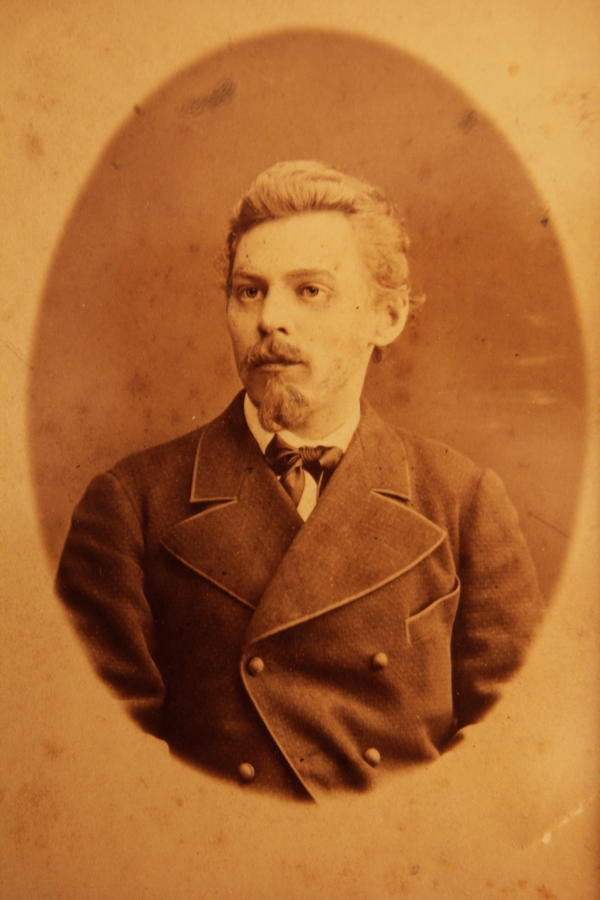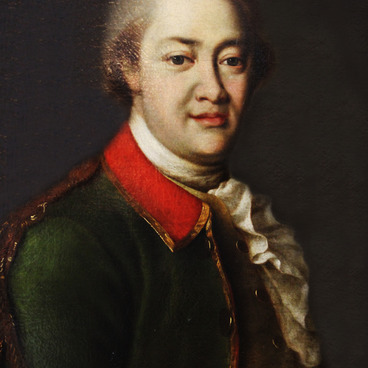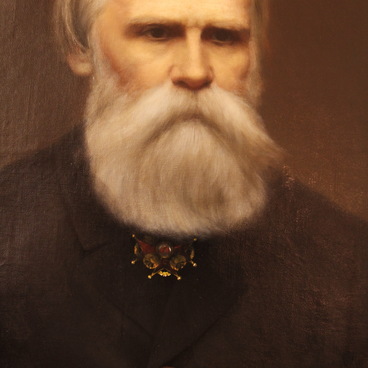Anatoly Luchshev was a well-known Kaluga doctor. He was born in Siberia in the city of Tomsk in the family of a local chief of police. In 1875, Luchshev graduated from the medical faculty of the Imperial Moscow University specializing in infectious and children’s diseases. After graduation, he worked as a zemsky (local council) doctor in Meshovsk uyezd (county). The task of a doctor at that time was not only to treat people, but also to explain to peasants the benefits of various prescriptions, convince them of the need to take medication.
Luchshev participated in the Russian-Turkish war of 1877-1878, he joined the army as a volunteer and worked at dressing stations. After the war, he returned to Meshchovsk and continued to work as a doctor for 25 years. In addition to medical practice, his duties included sanitary supervision over schools, educating people about hygiene, conducting sanitary activities. On January 1, 1895 Luchshev was appointed as staff physician to Khlyustin hospital in Kaluga where he served until the end of his life. The doctor died on the job, having contracted typhus during an epidemic.
On February 16, 1909 Vedomosti newspaper published an article In Memory of A.E. Luchshev. The author expressed deepest gratitude to the doctor who promoted trust in medicine among Kaluga peasants. Luchshev had three children, daughters Nina and Olga and son Anatoly who later became a leading meteorologist in the Soviet Union.
The fate of Anatoly Luchshev the elder was closely connected to Decembrist Gavriil Batenkov. After his exile in Tomsk Batenkov settled in Kaluga. He bought a house on Dvoryanskaya street, where he moved from Tomsk the family of his late friend Epenet Luchshev. Back in Tomsk Batenkov vowed to take care of Luchshev’s family and kept his vows.
Luchshev’s widow soon married a friend of the civil court chairman, and his children – Anatoly and Konstantin – received good education. After the death of their mother the house was inherited by Anatoly Epenetovich. Researchers have no data on the fate of his older brother.
The collection of the museum and ethnographic center House of G.S. Batenkov includes various articles belonging to Luchshev’s family donated to the museum by descendants of Anatoly Epenetovich: stamps, candleholders and others.
Luchshev participated in the Russian-Turkish war of 1877-1878, he joined the army as a volunteer and worked at dressing stations. After the war, he returned to Meshchovsk and continued to work as a doctor for 25 years. In addition to medical practice, his duties included sanitary supervision over schools, educating people about hygiene, conducting sanitary activities. On January 1, 1895 Luchshev was appointed as staff physician to Khlyustin hospital in Kaluga where he served until the end of his life. The doctor died on the job, having contracted typhus during an epidemic.
On February 16, 1909 Vedomosti newspaper published an article In Memory of A.E. Luchshev. The author expressed deepest gratitude to the doctor who promoted trust in medicine among Kaluga peasants. Luchshev had three children, daughters Nina and Olga and son Anatoly who later became a leading meteorologist in the Soviet Union.
The fate of Anatoly Luchshev the elder was closely connected to Decembrist Gavriil Batenkov. After his exile in Tomsk Batenkov settled in Kaluga. He bought a house on Dvoryanskaya street, where he moved from Tomsk the family of his late friend Epenet Luchshev. Back in Tomsk Batenkov vowed to take care of Luchshev’s family and kept his vows.
Luchshev’s widow soon married a friend of the civil court chairman, and his children – Anatoly and Konstantin – received good education. After the death of their mother the house was inherited by Anatoly Epenetovich. Researchers have no data on the fate of his older brother.
The collection of the museum and ethnographic center House of G.S. Batenkov includes various articles belonging to Luchshev’s family donated to the museum by descendants of Anatoly Epenetovich: stamps, candleholders and others.



